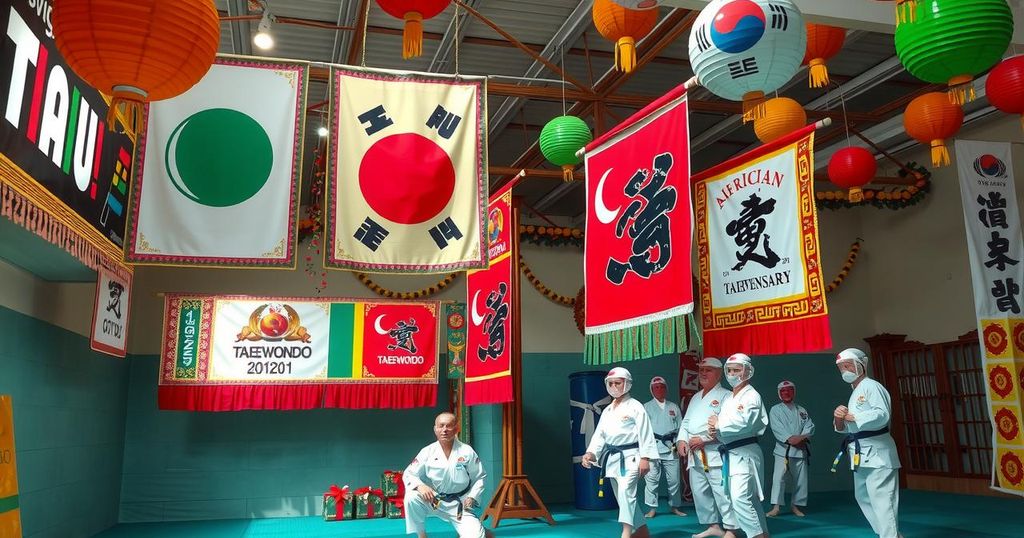Martial Arts Milestones Celebrated as African GOJU Marks 40 Years and Taekwondo Turns 50 in Ghana

African GOJU marked its 40th anniversary, while taekwondo celebrated its 50th in Ghana during a vibrant ceremony. Key speakers emphasized the importance of martial arts for youth discipline and cultural preservation. Notably, Hanny Zahabi was honored for his role in establishing taekwondo in Ghana. The event showcased young practitioners and reinforced the call for institutional support for martial arts in education and communities.
Last Sunday, two significant milestones in Ghana’s martial arts history were celebrated: African GOJU’s 40th anniversary and the 50th anniversary of taekwondo. The lively event took place at Beda’s Hotel and Events Centre in Ashongman, Accra, where veterans, enthusiasts, and local leaders came together to acknowledge the lasting impact and growing significance of these martial arts in Ghana.
Danny Gwira, the founder of African GOJU, made headlines at the celebration, urging Ghanaians to embrace indigenous martial arts. He emphasized that these practices are not merely about self-defence but also about instilling discipline in youth and preserving cultural heritage. “African GOJU is a unique system of martial arts involving 50 defensive techniques tailored to a typical African setting. It teaches you to endure, react, and be street-smart,” he remarked in an exclusive interview with Graphic Sports.
Gwira elaborated on how African GOJU is more than just physical training; it also promotes environmental awareness and community safety. He described the discipline as a lifestyle intertwined with African values, aimed at fostering mental and physical resilience against society’s challenges.
The event also honored pioneers of Ghana’s martial arts scene. Hanny Zahabi, who brought taekwondo to Ghana 50 years ago, was awarded a black belt in recognition of his contributions to the sport. Reflecting on the development of taekwondo, Zahabi shared, “The sport has come a long way and is now a national pastime in many communities.” He encouraged both current and future practitioners to uphold the fundamental values of martial arts, such as discipline and resilience.
A highlight of the celebration was the demonstration by over 20 young martial artists aged 6 to 15, showcasing their African GOJU techniques. Their performance captivated the audience and displayed the increasing interest in this traditional martial art among Ghana’s youth. Each child was awarded a certificate to signify their commitment to the discipline and its legacy.
The event brought together notable figures from the martial arts community. Ambassador George Haldane-Lutterodt, a former president of the Ghana Athletics Association and a supporter of African GOJU, presided over the proceedings. In his speech, he praised Gwira for his efforts in keeping the discipline relevant and stressed the need to secure its future. “Let us ensure African GOJU stands the test of time,” he asserted, while also recognizing the honourees and the importance of continuity.
Veteran martial artists like Donald Gwira and George Heward-Mills also attended, enhancing the occasion’s significance. Their participation underscored the dual purpose of the event: to pay homage to the rich history of martial arts in Ghana and to motivate future generations of martial artists.
This dual celebration underscored the pivotal role martial arts play as a transformative force within Ghanaian communities. With African GOJU’s foundational ties to indigenous philosophy and taekwondo as a respected global discipline, both have evolved beyond mere sports to become vital instruments for nation-building. As Gwira’s vision for youth empowerment gained traction, attendees called for broader institutional support for martial arts in schools and communities across Ghana.
The combined celebrations of African GOJU and taekwondo milestones reflect the deep impact of these martial arts in Ghana. Key figures like Danny Gwira and Hanny Zahabi embody the spirit of resilience, promoting youth development and cultural pride through martial arts. The event not only celebrated past achievements but also reinforced the urgency of institutional support for the future of martial arts in the nation.
Original Source: www.graphic.com.gh







